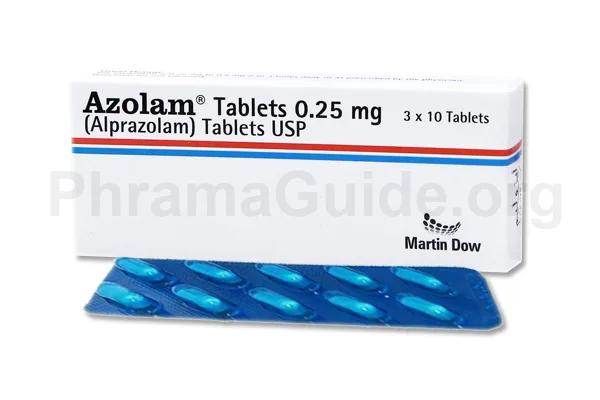Azolam tablet belongs to the benzodiazepine class, known for its ability to act on the central nervous system to produce a calming effect. It is used to address various anxiety disorders and related conditions, Including:
- Generalized Anxiety Disorder (GAD): Azolam tablet is used for the management of generalized anxiety disorder, a condition characterized by excessive and uncontrollable worry and anxiety. It can help alleviate symptoms such as restlessness, irritability, difficulty concentrating, and sleep disturbances associated with GAD.
- Panic Disorder: Azolam tablet is also used for the treatment of panic disorders, a condition marked by recurring and unexpected panic attacks. Panic attacks are episodes of intense fear and discomfort accompanied by physical symptoms such as rapid heartbeat, shortness of breath, sweating, trembling, and a sense of impending doom. Azolam can help reduce the frequency and severity of panic attacks and manage associated anxiety symptoms.
- Anxiety Associated with Depression: Azolam tablets may be used as an adjunctive treatment for anxiety symptoms in individuals with depression. It can help alleviate the anxiety that may accompany depressive disorders and improve overall well-being.
- Insomnia Due to Anxiety: Azolam tablet may be used for short-term relief of insomnia caused by anxiety. It can help induce relaxation and sedation, making it easier to fall asleep.
Off-label Uses of Azolam Tablet
- Sleep Disorders: Azolam tablets may be used off-label for the short-term treatment of sleep disorders, such as insomnia. It can help induce sleep and provide short-term relief for individuals experiencing difficulty falling asleep or staying asleep.
- Essential Tremor: Azolam tablets may be used off-label to help manage essential tremor, a neurological condition characterized by uncontrollable shaking of the hands, head, or other parts of the body. Azolam’s sedative properties may help reduce the severity of tremors.
- Social Anxiety Disorder: Although Azolam tablet is not specifically approved for social anxiety disorder (social phobia), it may be used off-label in certain cases where other treatments have been ineffective. Azolam’s anxiolytic properties may help reduce anxiety symptoms in social situations.
- Muscle Spasms: Azolam tablet may be used off-label for the short-term management of muscle spasms and associated anxiety. It can help relax muscles and provide temporary relief from muscle-related symptoms.

What is Azolam?
Azolam is one of the leading brands of Alprazolam, manufactured and marketed by Martin Dow Pharma, Pakistan.
Azolam Alternatives : Other Similar Brands
The following are Some Alternative Brands of Azolam and Their Manufacturers.
- ALP : Hilton Pharmaceuticals (Pvt) Ltd, Pakistan.
- Neuxam : Standpham Pakistan (Pvt) Ltd.
- Xanax : Pfizer Laboratories Inc.
- Paraz : Getz Pharmaceuticals (Pvt) Ltd, Pakistan.
- Azolam : Merck (Private) Ltd.
- Hilaxin : Himont Pharmaceuticals (Pvt) Ltd, Pakistan.
- Pralzo : Sami Pharmaceuticals (Pvt) Ltd, Pakistan.
- Neram : Genuix Pharmaceuticals (Pvt) Ltd, Pakistan.
- Xylepam : Brookes Pharmaceutical Laboratories (Pvt) Ltd, Pakistan.
- Pinix : Adamjee Pharmaceuticals (Pvt) Ltd, Pakistan.
- Zenith : Ferozsons Laboratories Ltd, Pakistan.
Azolam : Available Formulations and Strengths
Presently, Azolam is available in Tablet Form with the following strengths.
Azolam Tablets : 0.25mg, 0.5mg, and 1mg strengths.
Who Should Not Use Azolam?
Azolam has several contraindications, which are specific circumstances or conditions in which its use is not recommended due to potential risks or adverse effects.
- Hypersensitivity: Azolam is contraindicated in individuals who have a known hypersensitivity or allergic reaction to Azolam or other benzodiazepines. Signs of a hypersensitivity reaction may include rash, itching, swelling, dizziness, or difficulty breathing.
- Acute Narrow-Angle Glaucoma: Azolam is contraindicated in individuals with acute narrow-angle glaucoma. This condition is characterized by increased pressure inside the eye, which can cause severe eye pain, blurred vision, and potential vision loss. Azolam can further increase eye pressure, exacerbating glaucoma symptoms.
- Severe Respiratory Insufficiency: Azolam is contraindicated in individuals with severe respiratory insufficiency or respiratory failure. The medication can suppress respiratory function and may lead to respiratory depression, particularly in individuals with compromised lung function.
- Severe Liver Impairment: Azolam is contraindicated in individuals with severe liver impairment. The medication is metabolized in the liver, and impaired liver function can affect the metabolism and elimination of Azolam, leading to increased drug levels and potential toxicity.
- Myasthenia Gravis: Azolam is contraindicated in individuals with myasthenia gravis, a neuromuscular disorder characterized by muscle weakness and fatigue. Azolam’s sedative properties can exacerbate muscle weakness in individuals with myasthenia gravis.
What is the Recommended Daily Dosage of Azolam?
Azolam Dose for Anxiety Disorders:
- Initial Dose: One Tablet of 0.25mg or 0.5mg, three times daily.
- The dose may be gradually increased, if necessary, to a maximum daily dose of 4mg, divided into smaller doses.
Azolam Dose for Panic Disorder:
- One Tablet of 0.5mg or 1mg, once daily.
- The dose may be increased if needed, with a maximum daily dose of 10mg.
How Azolam Works?
Azolam works by binding to specific sites on GABA-A receptors in the brain. GABA-A receptors. By binding to GABA-A receptors, Azolam enhances the activity of GABA, which increases the influx of chloride ions into the neurons. This promotes the inhibitory effect of GABA, resulting in a calming and sedative effect on the CNS.

Leave A Comment